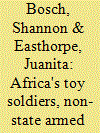|
|
|
Sort Order |
|
|
|
Items / Page
|
|
|
|
|
|
|
| Srl | Item |
| 1 |
ID:
113320


|
|
|
|
|
| Publication |
2012.
|
| Summary/Abstract |
Armed conflict on the African continent has witnessed increasing recruitment of child soldiers, often at the hands of non-state armed groups. Unfortunately this practice continues unabated in the face of legal obligations prohibiting the recruitment of child soldiers under international humanitarian law, and international and regional human rights law. While international condemnation of the practice has led to attempts to increase the minimum age for recruitment to 18, a disjuncture persists between the legal obligations states sign up to, and the actual enforcement of these prohibitions at a domestic level.
International criminal law jurisprudence emanating from the Special Court for Sierra Leone and the International Criminal Court is being monitored closely, as these courts seek to enforce the prohibition in all armed conflicts, and against both state actors and non-state armed groups. International humanitarian law only protects child soldiers who have been unlawfully recruited. In this piece, the authors take a closer look at what amounts to unlawful recruitment in light of customary international humanitarian law, since this body of law also binds non-state actors, even without further criminalising legislation at a domestic level. Moreover, the article briefly explores whether a child can ever void this protected status by volunteering to participate directly in hostilities.
|
|
|
|
|
|
|
|
|
|
|
|
|
|
|
|
| 2 |
ID:
137190


|
|
|
|
|
| Summary/Abstract |
According to the International Committee of the Red Cross (ICRC) publication Interpretive Guidance on the Notion of Direct Participation in Hostilities under International Humanitarian Law, all civilians (including child soldiers) lose their immunity from direct targeting ‘for so long as’ their actions amount to direct participation in hostilities. All civilians can, however, access the revolving door of protection and return to their civilian activities – complete with full immunity from direct targeting – provided the nature of their direct participation was spontaneous and disorganised. Once it can be ascertained that their participation in hostilities amounts to continuous combative functions, they relinquish their access to the revolving door of protection, and can be targeted at all times until they abandon their formal or functional membership of the belligerent group. This piece analyses how the revolving door phenomenon and the notion of continuous combative functions apply in instances where civilian child soldiers are directly participating in hostilities.
|
|
|
|
|
|
|
|
|
|
|
|
|
|
|
|
| 3 |
ID:
187341


|
|
|
|
|
| Summary/Abstract |
Using the current conflict in northern Mozambique as a case study, we argue that the South African government and its current legislation on private military and security companies (PMSCs) has prevented it from being a more effective agent for peace in the region. South Africa’s current legislation – the Foreign Military Assistance Act of 1998 (FMA) and the Prohibition of Mercenary Activities Act of 2006 (PMA) – creates a situation, a deliberate and intentional one, where PMSCs are unable to operate effectively effectively. Therefore PMSCs do not operate from South Africa, despite South African PMSCs being well regarded and experienced internationally. The FMA and PMA also oppose a general international trend which is seeing increased use and acceptance of PMSCs. We argue that the conflict in northern Mozambique is an example where legislation which is more accepting of the PMSC industry would have allowed South Africa to provide more (and earlier) assistance to Mozambique. This would have helped Mozambique and the region, but, importantly, it would also have been a valuable tool in South Africa’s foreign diplomacy and projected the potential for the use of smart power.
|
|
|
|
|
|
|
|
|
|
|
|
|
|
|
|
|
|
|
|
|